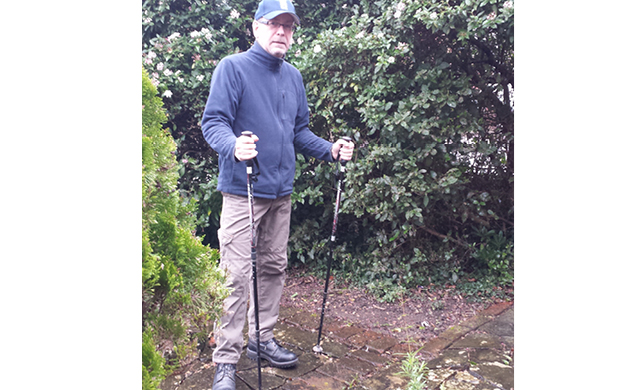Steve: 'my walking workout'

I’d always enjoyed walking but it was usually restricted to the occasional week-end or a holiday in a place where there was good walking. It wasn’t a regular part of my activity.
But for various reasons, I decided to pack in my gym membership and I was looking for something to take its place. I didn’t really enjoy the gym. It wasn’t a place I felt comfortable and I tended to do the same thing over and over again.
With the walking, I created my own routine. I try to walk every weekday morning from 7am for about 1 1/2 to 1 3/4 hours. There are lots of different routes around where we live, woods, a canal. I got a decent pair of walking boots – second-hand but ex-military. If you’re using them everyday you need a good pair. I also had some walking poles in my garage from a previous holiday so I use them too.
Incorporate your upper body
Obviously you don’t need the poles. But for me there are four benefits. They incorporate your upper body in the workout. They enable you to move more quickly which adds to the workout. I have arthritis in my feet and by using the poles to push-off I reduce the pressure on the balls of my feet. The fourth reason is that when it’s muddy and slippery, they stop you falling over.
The total cost is less than a £100 which compares to annual gym membership of about £150. But for me the great thing about a walking workout is that it’s in the open air. I’m pretty religious about walking in all weathers. That way when you do get a nice day, you savour it all the more.
I feel more rooted
I enjoy seeing the landscape changing and I’ve come to appreciate the area in which I live far more. I’m discovering new routes and creating my own and I feel far more rooted in the place I live.
You meet people and most people smile and say good morning. Do some of them look a little askance at the walking poles? Maybe – but frankly I don’t care. I know it works for me so it doesn’t bother me. (I don’t use the poles in town. They’re telescopic and I collapse them.)
The NHS reckons we should walk 10,000 steps a day. My walk is 12-13,000 steps and when you add in the usual everyday walking, I’m at about 17-20,000 steps a day. I have a jawbone, basically a pedometer on the wrist, which connects to my phone and I use it with the MapMyWalk app. It calculates steps, calories, elevation and so on. It tells me if I was faster or slower last time I did the same route. I don’t think any of this stuff is particularly important but it adds a bit of fun, the way gadgets do. You don’t need them though.
Perhaps walking is not quite such a full all-round workout as you can get in the gym but I never used to do that anyway and the other benefits of walking more than compensate for this, anyway. I’m not doing it for a tightly-honed physique. I’m doing it to keep active, healthy and because I like it. I feel better and I miss it when I don’t do it. I couldn’t say that about the gym.
|
The Men’s Health Forum need your support It’s tough for men to ask for help but if you don’t ask when you need it, things generally only get worse. So we’re asking. In the UK, one man in five dies before the age of 65. If we had health policies and services that better reflected the needs of the whole population, it might not be like that. But it is. Policies and services and indeed men have been like this for a long time and they don’t change overnight just because we want them to. It’s true that the UK’s men don’t have it bad compared to some other groups. We’re not asking you to ‘feel sorry’ for men or put them first. We’re talking here about something more complicated, something that falls outside the traditional charity fund-raising model of ‘doing something for those less fortunate than ourselves’. That model raises money but it seldom changes much. We’re talking about changing the way we look at the world. There is nothing inevitable about premature male death. Services accessible to all, a population better informed. These would benefit everyone - rich and poor, young and old, male and female - and that’s what we’re campaigning for. We’re not asking you to look at images of pity, we’re just asking you to look around at the society you live in, at the men you know and at the families with sons, fathers and grandads missing. Here’s our fund-raising page - please chip in if you can. |


